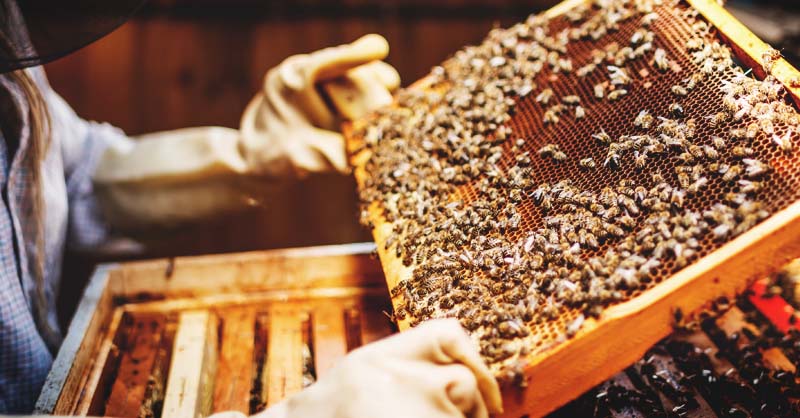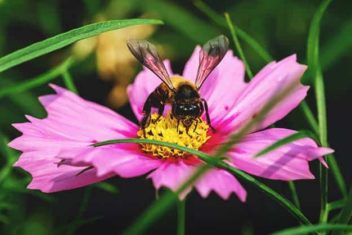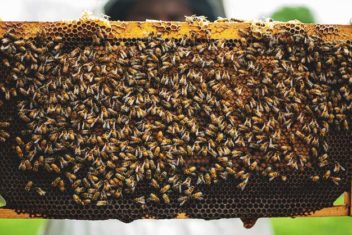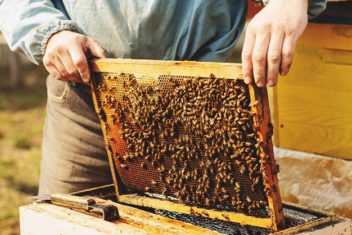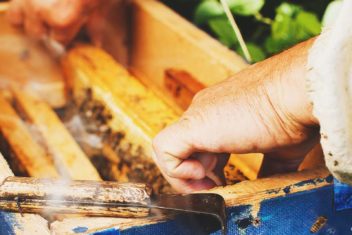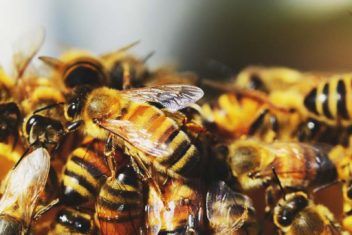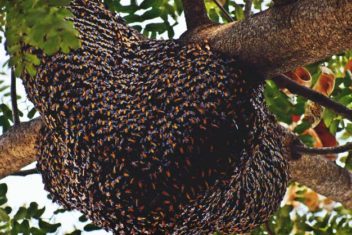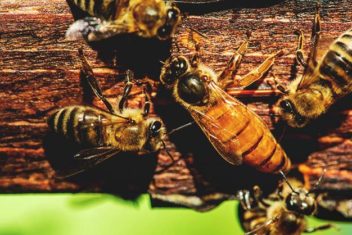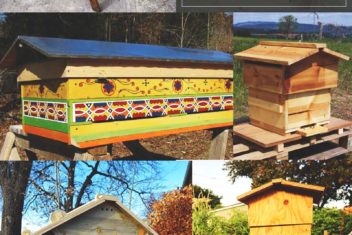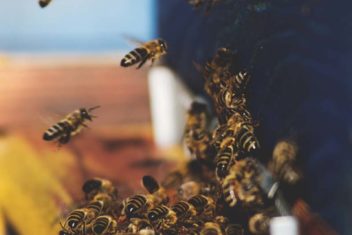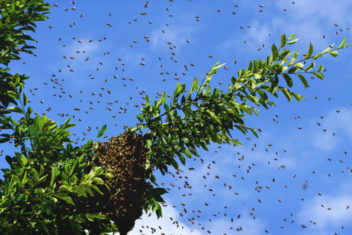Beekeeping can be a gratifying hobby, and career in some cases. But it’s crucial to consider the safety concerns before you make the decision to become a beekeeper.
While most bees won’t bother you if you respect their space, there are a few situations when bees may become aggressive (or defensive). When this happens, people in close proximity to the bee may be in danger.
Read on to learn more about the dangers that you may face as a beekeeper:
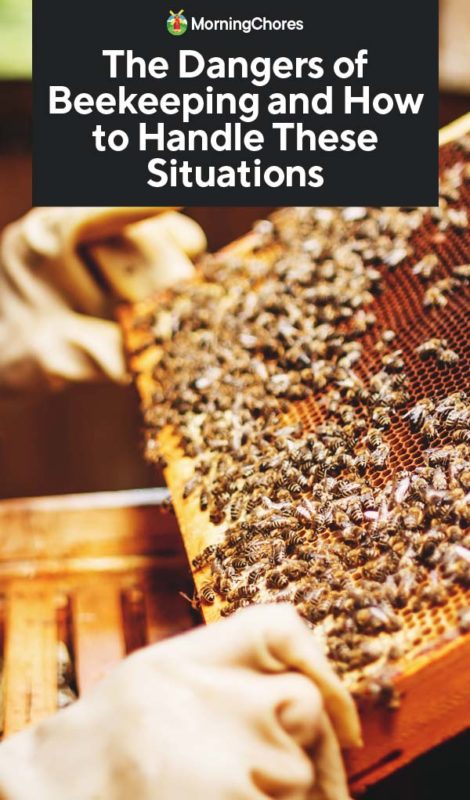
1. Bee Stings
It’s no surprise that bee stings are at the top of the list of beekeeping dangers. Stings are probably the one thing that gives bees a bad reputation.
Merely seeing a bee can send some people flailing and screaming.
And that’s because bee stings hurt!
But, did you know that most species of bees are quite docile, and have no intention of stinging unless they are defending themselves or their hive?
Bees don’t typically fly up to a human, or another animal, just to sting them. Luckily, they have to have a good reason first…like getting stepped on.
Preventing Bee Stings
To prevent bee stings, approach your hive calmly, and handle it with extreme care. Using a smoker before you begin to perform any maintenance or extraction will make your bees groggy and unlikely to sting.
Always wear the appropriate protective bee suit and beekeeping gloves and cover exposed skin before spending any time with your hive.
Treatment For Bee Stings
If you are stung, and you don’t have bee allergies, don’t worry.
I know, it hurts, but it will pass soon.
When bees sting mammals with fleshy skin, their barbed stinger often stays behind, and some of their innards as well–which will result in death for the bee.
So, while your sting hurts, the bee who gave it to you is probably gone for good.
Now that you know the bee is probably long gone, it’s time to treat your injury. Here’s how:
- It’s essential to make sure the stinger is not left in your skin, so look closely and scrape the stinger out of your skin with your fingernail.
- Never use a tweezer because you could break off the stinger, or push more venom into your body.
- You should clean the area of the sting, and use a cold compress to reduce swelling. If you have a lot of pain, over-the-counter pain medication will alleviate it.
- Lastly, to ease irritation and itching, apply hydrocortisone cream to make the sting a little more bearable.
There are other homemade and natural bee sting remedies which you could consider, but if you feel you have an allergic reaction it is vital to go an see your doctor or go to an ER.
2. Allergies to Bee Stings

If you aren’t sure if you have allergies to bee stings, it’s well worth the effort to get tested for allergies before purchasing beekeeping equipment.
Allergies to bee stings can be deadly, and even if you aren’t allergic to one sting, many stings can cause problems for most people.
For example, if you come across an aggressive hive, and you are stung repeatedly, you may experience an allergic reaction, go into anaphylactic shock, or worse.
Symptoms of an Allergic Reaction to Bee Stings
- Difficulty breathing
- Swelling of the tongue or lips
- Difficulty swallowing
- Intense itching
- Dizziness
- Hives or a rash
- Loss of consciousness
If you, or someone you know, experiences an allergic reaction, call 911 immediately.
Those who know they are allergic often carry an emergency EpiPen in case of bee stings. See if you can help them with this while you wait for help to arrive.
3. Aggressive Bees
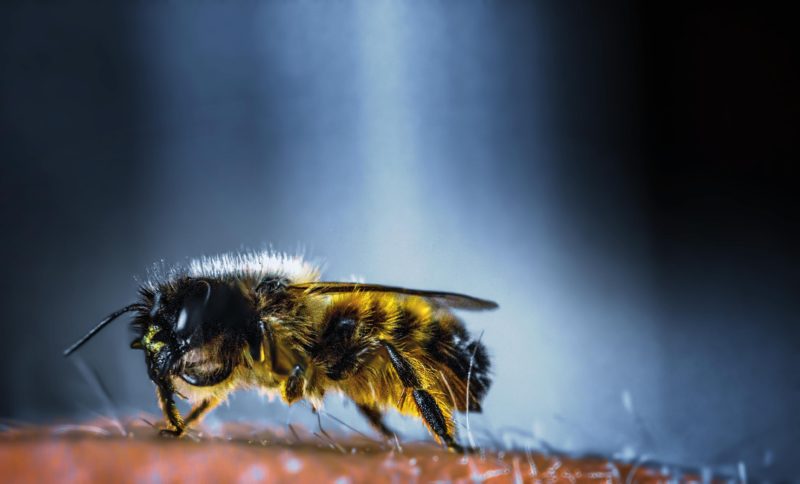
Even if you aren’t allergic, a large number of bee stings at once can cause anaphylactic shock. Even the most docile bees can become aggressive near their hive if the proper safety precautions aren’t taken before handling the hive.
Furthermore, some races of bees are known to be more aggressive than others, like the Africanized bee.
Contrary to popular belief, some bees can sting more than once, but not honeybees. If you are trying to promote pollination by hosting solitary bees with a DIY bee house, they may be able to sting repeatedly if they are unhappy.
Again, call 911 and seek help if you are stung repeatedly because even if you don’t have a known allergy, a significant amount of the venom injected by the bee, may cause shock and death if left untreated.
Educate yourself and any person who is regularly on your property, on what to do when bees attack. A little reading right now could give you just the right knowledge to manage such a horrible situation, and contrary to popular belief, jumping into a pool is not the best solution.
4. Neighborhood Disputes
On the lighter side, there’s always a danger of a neighborhood feud over keeping bees in a small community, especially if neighbors are allergic. Try your best to listen to those around you, and accommodate them, especially if there are medical concerns over your bees.
In ‘How to start beekeeping,’ we discuss how to decide on the perfect location which could help keep the peace between you and your neighbors.
Beekeeping is a great way to promote pollination and harvest honey, but if you aren’t careful, the dangers of beekeeping can be the difference between life and death.
Practicing safety, and using quality beekeeping tools and garments will go a long way in protecting yourself against beekeeping dangers.
And, as always, call 911 if you, or anyone else, is experiencing an allergic reaction…because time is of the essence.
